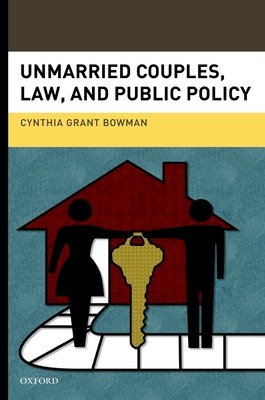
- We will send in 10–14 business days.
- Author: Cynthia Grant Bowman
- Publisher: Oxford University Press, USA
- ISBN-10: 0195372271
- ISBN-13: 9780195372274
- Format: 16.5 x 23.6 x 2.5 cm, kieti viršeliai
- Language: English
- SAVE -10% with code: EXTRA
Reviews
Description
In Unmarried Couples, Law, and Public Policy, Cynthia Grant Bowman explores legal recognition of opposite-sex cohabiting couples in the United States. Unmarried cohabitation has increased at a phenomenal rate in the U.S. over the last few decades, but the law has not responded to the legal issues raised by this new family form. Although a majority of cohabiting unions dissolve within the first two years, many are longer in term and function like other families; a large number of children also reside in these households. If one partner dies, is injured, or leaves the family, the remaining family members are left in an extremely vulnerable position in almost every state without any type of survivors' benefits, compensation for loss of a wage-earning partner, or remedies similar to those available upon dissolution of a marriage.
The author argues that the many benefits attendant upon formal marriage should be extended to cohabitants who have lived together for more than two years or give birth to a child. In order to avoid these consequences, a couple would need to opt out of them by contract. Professor Bowman reaches this conclusion after a thorough review of the history of the legal treatment of cohabitation in the United States, the inadequacy of the legal remedies available to cohabitants in most states, the now-voluminous social science literature about cohabitation, and the experience of six other countries (England, Canada, Australia, France, The Netherlands, and Sweden) that have attempted a variety of legal reforms to address the problems of cohabitants.EXTRA 10 % discount with code: EXTRA
The promotion ends in 23d.17:11:30
The discount code is valid when purchasing from 10 €. Discounts do not stack.
- Author: Cynthia Grant Bowman
- Publisher: Oxford University Press, USA
- ISBN-10: 0195372271
- ISBN-13: 9780195372274
- Format: 16.5 x 23.6 x 2.5 cm, kieti viršeliai
- Language: English English
In Unmarried Couples, Law, and Public Policy, Cynthia Grant Bowman explores legal recognition of opposite-sex cohabiting couples in the United States. Unmarried cohabitation has increased at a phenomenal rate in the U.S. over the last few decades, but the law has not responded to the legal issues raised by this new family form. Although a majority of cohabiting unions dissolve within the first two years, many are longer in term and function like other families; a large number of children also reside in these households. If one partner dies, is injured, or leaves the family, the remaining family members are left in an extremely vulnerable position in almost every state without any type of survivors' benefits, compensation for loss of a wage-earning partner, or remedies similar to those available upon dissolution of a marriage.
The author argues that the many benefits attendant upon formal marriage should be extended to cohabitants who have lived together for more than two years or give birth to a child. In order to avoid these consequences, a couple would need to opt out of them by contract. Professor Bowman reaches this conclusion after a thorough review of the history of the legal treatment of cohabitation in the United States, the inadequacy of the legal remedies available to cohabitants in most states, the now-voluminous social science literature about cohabitation, and the experience of six other countries (England, Canada, Australia, France, The Netherlands, and Sweden) that have attempted a variety of legal reforms to address the problems of cohabitants.

Reviews